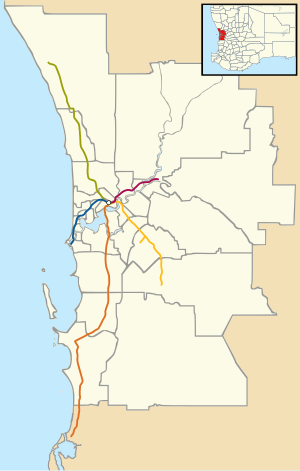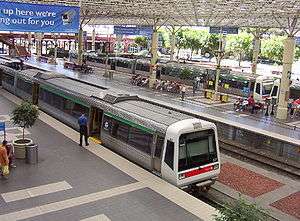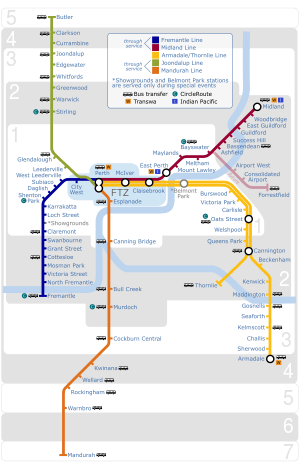Transperth Trains
|
| |||
|
A-series trains at Perth station in January 2005 | |||
| Overview | |||
|---|---|---|---|
| Owner | Public Transport Authority | ||
| Locale | Perth | ||
| Transit type | Commuter Rail | ||
| Number of lines | 7 | ||
| Number of stations | 70 (3 underground) | ||
| Annual ridership | 64.2 million (June 2015) | ||
| Operation | |||
| Began operation | 1998 | ||
| Operator(s) | Transperth | ||
| Technical | |||
| System length | 180.8 km (112.3 mi) | ||
| Track gauge | 1,067 mm (3 ft 6 in) | ||
| |||
Transperth Trains is a division of Public Transport Authority of Western Australia. It is responsible for operating Perth’s urban passenger rail system, as part of the Transperth network.
History
The Fremantle to Guildford line commenced operating as a steam-powered service in March 1881, followed by the Perth to Armadale line in May 1889, and the Perth to Joondalup line (now Butler) in 1993 and the Perth to Mandurah line in December 2007. The Fremantle line service ceased in September 1979 but was reinstated in July 1983.[1] Diesel trains were used on the rail network until the three lines then in service, the Armadale, Fremantle and Midland, were electrified in the early 1990s.
The first service with the A-series train was introduced in September 1991, with regular services beginning on the Armadale line on 7 October 1991. The Midland and Fremantle lines commenced service with the then-new A-series trains in December 1991.
The conversion from diesel to electric trains was accompanied by many upgrades to the rail network, such as upgrades to stations and tracks, and the cost of the undertaking was estimated at around $109 million.
Northern Suburbs Transit System
The Northern Suburbs Transit System was the name given to the project to provide high-speed passenger rail services to the northern corridor of metropolitan Perth. To service the expanding northern suburbs, Joondalup line was built in the median of the Mitchell Freeway in the early 1990s, after several years of planning.[2] The line was later extended to Currambine in 1993, to Clarkson in 2004 and Butler in 2014.
Mandurah Line
Legislation for the construction of the Mandurah Line was passed in December 1999.[3] The original proposed route branched from the Armadale line at Kenwick, and then ran alongside the freight lines until Jandakot where it would run in the middle of the Kwinana Freeway. However, a bill passed in November 2002 after a change of state government saw that the route would start at Perth, traverse the Kwinana Freeway, and then continue along its initial route after Jandakot.[4]
Construction of the line started in February 2004 and it opened on 23 December 2007.[5]
Thornlie Spur
Because the government did not begin its review of the Mandurah Line masterplan until after construction had begun, the tunnel under the Roe Highway had already been constructed. To make use of the new tunnel, the government decided to convert this section into a small spur line to Thornlie.
It was decided that Armadale trains would alternate with Thornlie trains, with the Thornlie trains stopping at all stations and Armadale trains only stopping at Oats Street and Cannington stations. Thornlie station opened on 7 August 2005.
New MetroRail

In 2003, the government launched the New MetroRail program as the official name of the upgrades to the rail network. This program included the following projects:
- Extension of the Joondalup line to Clarkson and the construction of a new Currambine station.
- Construction of Nowergup railway depot.
- Purchasing 93 B-series carriages to service the Clarkson and Mandurah lines. These railcars would be configured as 31 three-car sets.
- Construction of the Thornlie line and Armadale spur line.
- Rebuilding Armadale, Bassendean and Gosnells stations in 2004/05.
- New Greenwood station built in 2005 between Warwick and Whitfords to relieve the pressure on these stations.
- Upgrade of West Leederville station, including a third platform, to help serve crowds from Subiaco Oval.
Future expansion
In the 2009–10 state budget funding was allocated for extending the Joondalup line north to Butler, with construction scheduled to start in 2010.[6] In addition, the Airport Masterplan calls for a spur line from the Midland Line to connect to Perth Airport. The line would deviate between Bayswater and Ashfield stations, run through the suburb of Redcliffe.
While this link has been the subject of studies and plans since at least 2008[7] and appeared in the PTA 2010[8] report it has disappeared entirely from the 2011 report.[9]
A link to Ellenbrook had been promised by Premier Alan Carpenter and Opposition Leader Colin Barnett prior to the 2008 elections however this had evaporated by 2011.[10]
Former Premier Alan Carpenter had announced a study on the feasibility of a high-speed rail service running from Perth to the south city of Bunbury as a replacement of the current Australind train service. The study stated a new line could be built just after Cockburn Central station on the Mandurah line, then following the Kwinana Freeway south to the new Perth-Bunbury Highway and following the highway until it reaches Bunbury.
In 2011, the Public Transport Authority announced that the Joondalup line would be extended to Butler. Butler opened on 21 September 2014.[11]
In August 2014, the government announced the Forrestfield-Airport Link would be constructed providing a service to Perth Airport and Forrestfield.[12][13] Construction commenced officially in November in 2016, with the line due to open in 2020.[14]
Current system
Route
Transperth runs five train lines with one spur line. These lines are:
- Armadale/Thornlie line – goes in a south-east direction to Armadale. The Australind continues along the same track to Bunbury. A spur line to Thornlie station opened on 8 August 2005.
- Fremantle line – goes in a westerly direction towards Fremantle. Major stations include Subiaco and Claremont. When trains arrive at Perth station they continue through to the Midland Line.
- Joondalup line – goes in a northern direction, on the Mitchell Freeway central reservation, before moving eastward near Eddystone Avenue through to Joondalup, then returning to the Mitchell Freeway reserve and continuing towards Clarkson. The line then continues currently as a two single track split up at Nowergup depot, then merge back and continues to Butler. When trains on the Joondalup line arrive at Perth station, they continue through to the Mandurah line. Future expansion plans provide for the extension of the line to Yanchep.
- Mandurah line – goes in a southward direction, on the Kwinana Freeway central reservation until Kwinana, then curving south-west towards Rockingham and then south to Mandurah. When trains on the Mandurah line arrive at Perth station, they continue through to the Joondalup line.
- Midland line – goes east towards Midland. Transwa services diverge and continue to Kalgoorlie (the Prospector) and to Merredin (the AvonlLnk). When trains arrive at Perth they continue through to the Fremantle Line.
All of the above services except the Prospector and AvonLink run on 1,067 mm (3 ft 6 in) narrow-gauge tracks. The Prospector and AvonLink run on 1,435 mm (4 ft 8 1⁄2 in) standard gauge tracks and takes the same route as the Midland line services. Consequently, the track between East Perth and Midland is dual gauge.
Stations
Transperth serves the following railway stations:
Patronage
| Transperth Trains patronage | ||
|---|---|---|
| Year | Patronage | ±% |
| 2003–04 | 31,114,975 | — |
| 2004–05 | 32,652,117 | +4.9% |
| 2005–06 | 34,132,593 | +4.5% |
| 2006–07 | 35,757,833 | +4.8% |
| 2007–08 | 42,636,075 | +19.2% |
| 2008–09 | 54,749,770 | +28.4% |
| 2009–10 | 56,408,742 | +3.0% |
| 2010–11 | 58,867,780 | +4.4% |
| 2011–12 | 63,029,878 | +7.1% |
| 2012–13 | 65,689,337 | +4.2% |
| 2013–14 | 63,491,683 | −3.3% |
| 2014–15 | 64,224,895 | +1.2% |
| Source: The Public Transport Authority of Western Australia | ||
Below is the annual patronage of each railway line as of the 2014/15 financial year. Figures are provided as total boardings, which includes all fare-paying boardings and free travel on stations within the free transit zones as well as transfers between stations. The figures for rail replacement and special events services are included in the total but not allocated to any railway line.[15]
| Railway line/services | Patronage | % | |
|---|---|---|---|
| Mandurah | 20,699,900 | 32% | |
| Joondalup | 17,105,797 | 27% | |
| Armadale/Thornlie | 9,066,797 | 14% | |
| Fremantle | 8,228,255 | 13% | |
| Midland | 6,661,434 | 10% | |
| Rail replacement/special services | 2,462,712 | 4% | |
| Total annual patronage | 100% | 64,224,895 | |
Fleet
Current fleet
- 43 two-car first-generation A-series EMU sets/86 carriages
- 5 two-car second-generation A-series EMU sets/10 carriages
- 66 three-car B-series EMU sets/198 carriages being delivered
- One GE U20C diesel locomotive
A-series EMU

The A-series electric multiple-unit sets are two-car trains with a driver’s cab at each end. They were built by ABB and Walkers in Maryborough, Queensland.
The A-series sets were built for the electrification of Perth’s suburban railway system in the early 1990s and the Joondalup line, which was being constructed in the same period. The first was delivered on 1 September 1990. The original order for 43 first-generation trains were followed by an additional order for 5 second-generation trains due to the Joondalup line exceeding passenger estimates. Delivered in 1998, the second-generation trains differ in having LED screens and other upgrades to security and accessibility. A-series sets can be coupled to form four or six carriage sets.
B-series EMU
Introduced in October 2004, the B-series are the newest electric trains to operate in Perth. They were built by Bombardier Transportation and Downer Rail in Maryborough, Queensland, and operate on the Joondalup and Mandurah lines.
Each sets consists of three carriages. The powered 'A' and 'B' cars each have a driver’s cab, while the central 'T' car is entirely devoted to passengers, and supplies power from overhead lines to the powered cars. The B-series trains operate as three, six and nine carriage sets. They have a top speed of 130 km/h.
On 19 September 2006 Premier Alan Carpenter, announced that the Public Transport Authority would purchase another 15 new 3-car sets from the EDI Rail-Bombardier Transportation joint venture. The first three B-series railcar sets were introduced on 28 June 2009 and have allowed some of the A-series trains to be transferred to the Midland-Fremantle line. As more sets become available, they will allow the remaining two-car A-series trains currently being used on the Perth-Butler line to increase total capacity for the Armadale-Perth and Midland-Fremantle services, with an overall increase of 3,900 passengers, or more than 30%. By January 2016 66 sets will be in service.
Diesel locomotive
Transperth purchased a GE U20C, originally from Kereta Api Indonesia, from Greentrains in 2014 for use as a shunter at Claisebrook depot.
Future fleet
50 new six carriage trains are planned to enter service between 2018 and 2028.
Past fleet
Transperth operated diesel multiple units prior to the introduction of electric trains in 1992.
- 10 ADX class, introduced starting 1959, withdrawn between 1982 and 1988
- 18 ADG class, introduced in 1954, withdrawn in 1992
- 4 ADH class, built for regional service in 1955/1956, transferred to metropolitan service in 1962/3, withdrawn in 1992
- 10 ADK/ADB class, withdrawn in 1993 and sold to New Zealand Rail
- 10 ADL/ADC class, withdrawn in 1993 and sold to New Zealand Rail
Two sets of SX carriages were leased from Queensland Rail in 1986. They were originally intennded for use during the 1987 America's Cup but remained in Perth until 1991.
Following the separation from Westrail, Transperth retained an MA class diesel-hydraulic locomotive for shunting at Claisebrook depot. It was withdrawn in 2014.
Depots
Transperth trains run from two main depots and one minor depot:
- Nowergup Depot, located beyond Clarkson station. This is the home depot for B series trains.
- Claisebrook Depot, which is next to Claisebrook. This is the home depot for A-series trains.
- A smaller depot at Mandurah has been constructed to stable B series trains.
See also
References
- ↑ Mees, Paul (2009). Transport for Surburbia: Beyond the Automobile Age. Routledge. ISBN 978 1844077403.
- ↑ Transport 2000 – A Perth Study, Northern Suburbs Rapid Transit Study (File 8722/1). Perth, Western Australia: Department of Transport, Government of Western Australia. 1987. Accessed at State Records Office of Western Australia, Perth
- ↑ "PTA History at a Glance, 1976 to 2000".
- ↑ "PTA History at a Glance, 2001 to Present".
- ↑ "1500 people take the first Perth to Mandurah train journey". Archived from the original on 24 December 2007. Retrieved 23 December 2007.
- ↑ "2009-10 State Budget: Transport initiatives designed to keep Western Australia moving". Public Transport Authority. 18 May 2009. Archived from the original on 22 May 2009. Retrieved 14 June 2009.
- ↑ Judge airport rail link fairly: Labor
- ↑ Infrastructure Planning and Land Services
- ↑ Infrastructure Planning and Land Services
- ↑ When is a promise, a broken promise?
- ↑ "Butler train station and extension project". Retrieved 19 November 2013.
- ↑ 8km Forrestfield-Airport Link tunnel revealed Government of Western Australia 9 August 2014
- ↑ Perth rail link approved Railway Gazette International 13 August 2014
- ↑ Forrestfield-Airport Link Public Transport Authority August 2014
- ↑ Annual Report for year ended 30 June 2015 Public Transport Authority
External links
| Wikimedia Commons has media related to Transperth Trains. |


